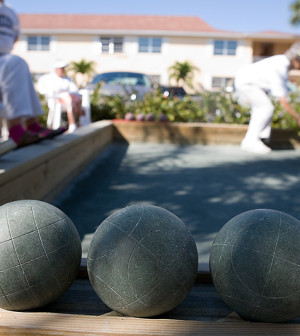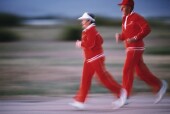- Could Your Grocery Store Meat Be Causing Recurring UTIs?
- Are You Making This Expensive Thermostat Error This Winter?
- Recognizing the Signs of Hypothyroidism
- 10 Strategies to Overcome Insomnia
- Could Artificial Sweeteners Be Aging the Brain Faster?
- Techniques for Soothing Your Nervous System
- Does the Water in Your House Smell Funny? Here’s Why
- Can a Daily Dose of Apple Cider Vinegar Actually Aid Weight Loss?
- 6 Health Beverages That Can Actually Spike Your Blood Sugar
- Treatment Options for Social Anxiety Disorder
Jogging May Help Seniors Walk Better


Jogging helps seniors maintain their ability to walk, a new study finds.
The researchers looked at people older than 65 who either ran or walked for exercise. Those who ran at least 30 minutes three times a week were less likely to have age-related physical decline in walking than walkers.
In fact, joggers were 7 percent to 10 percent more efficient at walking than those who didn’t jog, according to the study published online Nov. 20 in the journal PLoS One.
“What we found is that older adults who regularly participate in high-aerobic activities — running in particular — have what we call a lower metabolic cost of walking than older, sedentary adults. In fact, their metabolic cost of walking is similar to young adults in their 20s,” Justus Ortega, associate professor and director of the Biomechanics Lab at Humboldt State University in Arcata, Calif., said in a university news release.
Metabolic cost — which refers to the amount of energy required to move — naturally increases with age. High metabolic cost makes walking more difficult and tiring. A decline in walking ability is a major predictor of health problems in older adults.
“The bottom line is that running keeps you younger, at least in terms of efficiency,” study co-author Rodger Kram, a professor of integrative physiology at the University of Colorado, Boulder, said in the news release.
The researchers plan to investigate whether other highly aerobic activities — such as cycling and swimming — also slow age-related physical decline.
More information
The U.S. National Library of Medicine has more about seniors and exercise.
Source: HealthDay
Copyright © 2026 HealthDay. All rights reserved.










